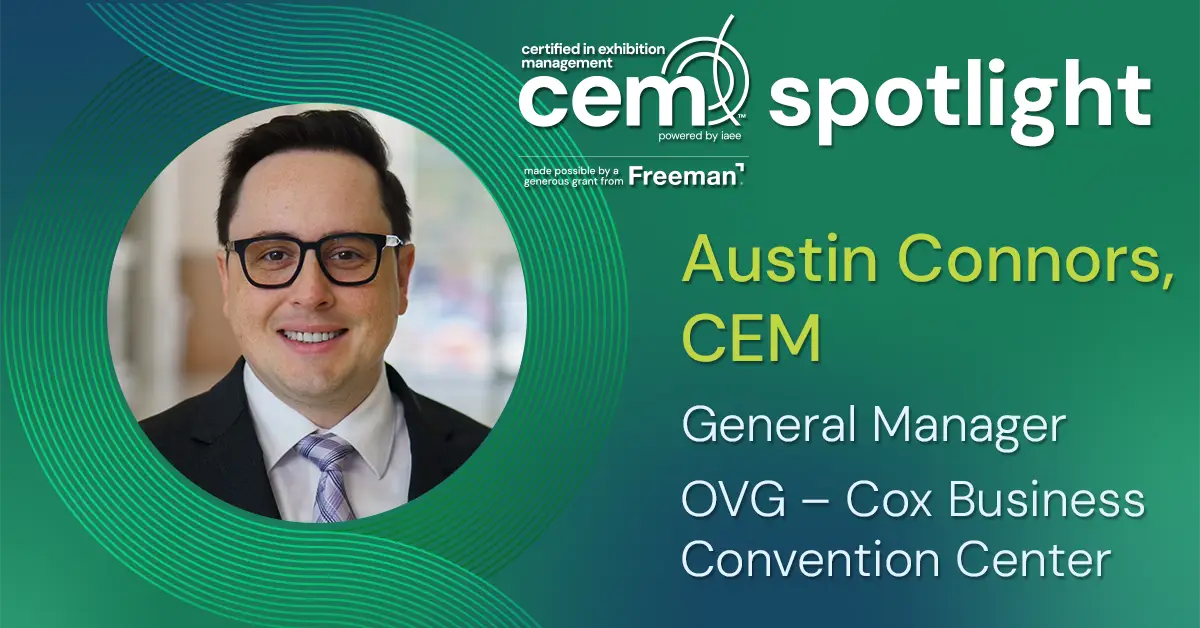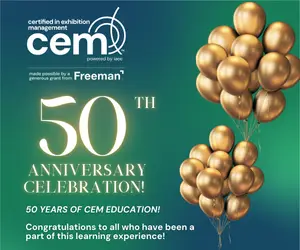Austin Connors, CEM, has been engaged in the hospitality industry for more than 15 years with leadership experience in convention centers and theaters, as well as fundraising, restaurant, and non-profit management. Currently, he serves as the General Manager for the Cox Business Convention Center, an Oak View Group managed facility, in Tulsa, Oklahoma. During the pandemic, Austin earned his master’s degree in Hospitality Management from Temple University’s School of Sport, Tourism, and Hospitality Management.
Austin’s passion for the meeting and events industry was instilled at a young age through his work in theater in both acting and production, and continued through college with a degree in Classical Studies, where he focused on the origins of western civilization and “bread and circuses” from Ancient Greece and Rome. Today, he is excited for the continued evolution of the convention industry with a focus on localized, experiential engagement in facilities.
Here, Austin shares how he has benefited from earning his CEM designation as well as how he applies the tools he learned to his current role in the industry.
How has the CEM designation helped in your career?
The CEM designation shows my commitment to the exhibitions and events industry. As my career continues on the venue side of the business, this designation helps maintain a visual representation of the relationship between my role and those who operate in the venue.
Why is it important to maintain the CEM designation?
The events industry is ever evolving, as we have seen recently with COVID and now the increased utilization of AI. The CEM Learning Program is uniquely positioned to stay fluid as the industry evolves over time, consistently providing a foundation of knowledge in the world of exhibitions and events, and allowing members to stay current with new knowledge as it enters our industry.
What made you want to obtain your CEM designation?
As a venue operator, it is imperative for me to stay active and engaged in the planning focus of events and exhibitions. The CEM Learning Program helps provide direct knowledge and a public designation that I am focused on the execution and success of the shows that exhibit in the venues I operate.
What advice would you give to an aspiring individual who wants to apply for the CEM program?
Education is the foundation of our industry – we go through it every day that we experience a new show or a new challenge on the job. The CEM Learning Program provides hard tools to help form that experience, and provides renewed perspective on the strategy that it takes to execute a successful event and work with others in our industry.
How did you start your career in this industry?
I grew up as a second-generation industry professional – my father, Thom Connors, retired from SMG about seven years ago, and I spent a lot of time growing up running around empty exhibit halls, stadiums, and theatres. I started my career initially in food service, managing a restaurant, then in the theatre sector managing fundraising, patron management, and front of house theatre operations. My official start in the event and exhibits industry began in the Tucson Convention Center complex as an Event Manager.
How have you made a difference with your show or with working with a client by applying the knowledge you gained by obtaining your CEM designation?
The importance of the economic impact on the cities we serve is the underlining reason that we operate in the venue sector. Being able to speak with clients and event planners about their individual economic impact helps our show organizers to better represent their importance to the region. This understanding also helps the communities we serve to better understand the importance of convention centers and the events industry, and the role we play in tourism and hospitality.
What was it that you did or implemented right after obtaining your CEM?
I began as General Manager of the Cox Business Convention Center in Tulsa, OK, and am engaging with our team to elevate our level of service and impact in the tourism and hospitality community.
What is one thing most people don’t know about you?
I was a professional stage actor for about three to four years as a kid, earning enough credits to join the Actors Equity before I was old enough to drive.


